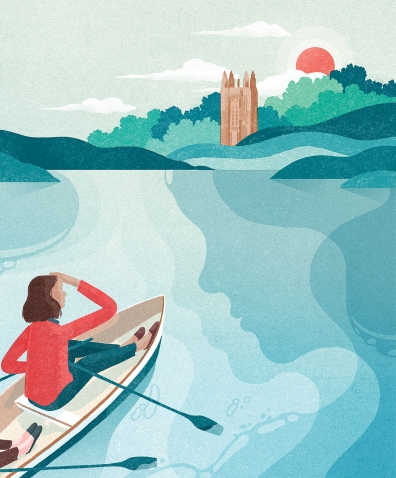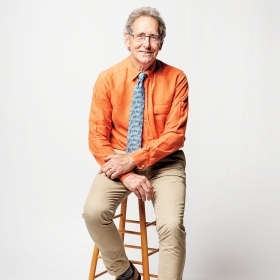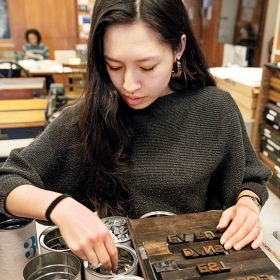Junior year, I was tired. I washed dishes at Pomeroy dining hall five mornings a week, worked a few shifts in the Cage, made sandwiches at El Table (which I also managed), and intermittently photographed for this magazine. There were also, of course, extracurriculars and classes—and the exhilaration of living on a lake, in the sort of room I felt certain I would never be able to afford once I was sent away. Graduation is the intersection of success and banishment, and every day at Wellesley, I willed my senses to collect memories to beat the coming exile. To love the place with a catalogue of details. I told myself: Notice the dips in the stairs, the little gold letters. There were brilliant and beautiful faces in every hallway, at every table. I reveled in not only the faces but also the arches in the hallways, the carvings in the tables. That sort of exhilaration is not sustainable. I was tired my entire junior year, and then finals happened.
“I know why he wanted us to look at these photographs,” I whispered to Megan. We were viewing an exhibition off campus as part of our English 366 final exam. “They’re 3D.” I hadn’t slept in two days, and I was hallucinating. Megan linked a steadying arm in mine.
“Absolutely do not say that to the class at large,” she whispered.
“But they are,” I insisted. I tried to move to look at the photographs from the side. Megan held me in place.
“Do not say a single word about these photographs,” Megan hissed. “If you want to pass this class, shut up. Do you understand?”
I nodded, not understanding, because I really did see topography in the pictures hanging on the gallery walls.
When our bus returned to campus, I dragged myself up the stairs to Jewett, down the hall to the study alcove across from the art library. (It’s a media classroom now.) I sat at one of the monitors, where I intended to blitz through a last paper. Under the desk, the hard drive’s warmth hit my knees. The buzzy comfort felt like summer back home in Kentucky, heavy with bugs. Nothing lulls me faster than a cicada. I slid from my rolling chair to the space under the desk, where I curled my body to match the cords, and I fell asleep.
The summer after I graduated, I slept on a futon in the middle of my classmate’s pear orchard. Katie lived in Northern California, and that summer she collected unemployed classmates. On her farm, we zoned out, built muscles, ate well, and slept hard. I had no income, but the view from my futon was vineyards, mountains, and sky. It was, dare I say, more beautiful than Lake Waban. And somehow, I wasn’t scared of losing it. The more I slept, the dirtier my hands, the longer I felt like I’d known the bends in the Trinity River. I could drive three hours in those mountains without a map, and I knew when I eventually left the farm for good, I would always be able to find my way back. That sort of familiarity makes a place home.
I didn’t live in California again for 10 years, and the job that took me to Los Angeles required travel. I was on the East Coast for work when, on a lonely Saturday morning, a classmate posted a photo of Wellesley’s campus. She had just arrived for our reunion. I had been too busy settling into my new life to register. I threw my toothbrush in a backpack, walked down the street, and rented a car. Once I hit the Mass Pike, I turned off my GPS, just to see if I remembered the way.
“When we were here, did you ever take out a canoe?” Meesh asked. We were standing on Green Beach, squinting into the perfect sun. I shook my head. I started to explain how many jobs I had, how tired I was, but Meesh was already heading toward the boathouse.
“Don’t we need an orientation or something?” I called after her.
Meesh tossed me a life vest. “Hi, we’re taking out this canoe,” she called to the student worker. “I’ll steer,” she said to me.
Our paddles cut into the water, and within minutes I was staring up at my old dorm room window. In retrospect, not a large room. We paddled harder, to the center of the lake, where we had the broadest view of campus—all the places I had tried to know completely, laid out in a smile of shore. I didn’t feel banished.
Meesh and I cruised across to the President’s House, where another student worker—this one in a motor boat—called for us to turn back. We wanted a peek at the swan, so we pretended not to hear. The student worker called again and tried to rev her motor. It died. She yanked the starter cord. Like us, the engine didn’t respond. Meesh and I had reached the mouth of the cove. The student worker yelled this time. She was as effective as a gentle breeze (which at the moment was pushing us farther into the restricted zone).
Meesh looked back. “Well, we should probably help her.”
I groaned. Meesh wrenched the canoe toward the center of the lake.
“You flooded the engine,” I called. “Give it a sec.”
Our boats had floated within feet of each other. We made small talk about on-campus jobs while her engine drained. To put it mildly, the student was busy. She tried the starter again, and the motor puttered to life.
“Hey, congrats,” Meesh said. “Can we go into the cove now? As a trade?”
“It’s not allowed,” the student worker said, eyeing another rule-breaker across the water. And off she zipped, bouncing us in her wake.
“Students these days,” I said.
“Let’s sit here awhile,” Meesh said, balancing her feet on each side of the canoe as the wake subsided.
The voices from Green Beach were barely audible. The sun was warm. With a glance toward the student worker, Meesh slipped off her life vest. She leaned back, propped the vest behind her head, and closed her eyes. To time and tiredness, I had lost—and missed out on—so many details of Wellesley. But these sounds, this water, they would always be familiar. I suspected the student—now across the lake, absorbed by other wayward alums—needed to be let in on a secret: Sometimes being scared of losing a place is how you do, for a while. If that happens, know the essential parts of this particular place make memories in our bones. And after you leave, you can come back.
Kate Erickson ’05 is a TV writer based in Los Angeles, where she has most recently written for The Passage (Fox). Her personal essays have appeared in the Christian Science Monitor and the New York Times, among others. She can be found on Twitter at @katefromky.








We ask that those who engage in Wellesley magazine's online community act with honesty, integrity, and respect. (Remember the honor code, alums?) We reserve the right to remove comments by impersonators or comments that are not civil and relevant to the subject at hand. By posting here, you are permitting Wellesley magazine to edit and republish your comment in all media. Please remember that all posts are public.